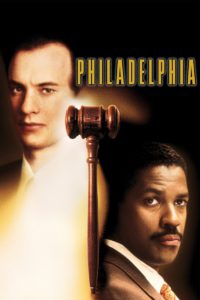Ringside Report Looks Back at the Oscar Winning Movie Philadelphia
Things got a little dull around the house last weekend. A long mentally grueling week coming to an end, and a desire to do anything but the “honey-do” list. Flipping through some of my movies, I noticed Philadelphia. I looked at my wife and asked if she wanted to watch it with me. I am glad she accepted. The film was award winning piece that focused on the mainstream view of the AIDS virus, really, the first of it’s kind.
The movie caught me quick as it opened with the titled theme song of Philadelphia by Bruce Springsteen. The transition into the film was as prominent as the transition a person infected with the AIDS virus notices their own transitions, slow and to a final point.
We meet up with Academy Award Winner Tom Hanks as the main character, Andy Beckett, working diligently as a lawyer in one of the most prominent law firms in all of Philadelphia. Showing a friendly, extroverted Beckett making his way through the firm being jovial as usual with everyone in the firm to the point where he is shown preparing for a huge case, clearly after hours. The first part of the film clearly shows a well-respected, well-liked, and meticulously good attorney being promoted through the ranks of the firm and handed one of the most important cases in the firm’s history. As congratulations were being had, one of the firm’s partners notices a lesion on Beckett’s forehead, at which he quickly claims was a racquetball incident in his continuous attempt to hide his homosexual and AIDS status to the firm.
As Andy becomes to fall apparently ill as the disease continues to progress, the film takes us through Beckett finalizing briefs that are due for the big case, dropping them off at his desk and notifying team members where the documents are left for filing. The disease continues to eat away at Andy, forcing him to the hospital. During his crucial illness and evaluation by doctors, hell has broken loose at the firm around the missing briefs Andy had left on his desk for filing.
Miraculously, the documents were found in time to file appropriately, but as a result of the chaos, the firm fires Beckett, placing the blame on him. Beckett draws up a conclusion that the firm had figured out his AIDS status and let him go on that basis, and rightfully coming to that conclusion considering his most recent promotion and handing of the big case.
Beckett pursues rival attorney Joe Miller, portrayed by Denzel Washington, to take his case. Miller hears Andy out on his theory, but initially refuses, clearly on the stigma people with AIDS portrayed in the early 90’s. After deliberation and a brief encounter of being discriminated against, he finds himself in Andy’s shoes and decides to take the case.
The movie continues down an eye-opening path, especially when reflecting back over time. The arguments from the defense were a series of falsehoods bashing Beckett’s competence and character, citing many ongoing mistakes and that of a liar for not sharing his gay/AIDS status with the firm. Witness after witness denounces those perceptions of Beckett and continues to paint the partners of the firm as bigots.
As the case continues on, we see the decline of Beckett’s health on a path to certain death. Attorney Joe Miller brilliantly poses a strong case inspiring a prejudicial fear and stigma associated from people against those of the homosexual lifestyle, and particularly with those with AIDS. The uncertainty at that point of time of the virus caused a fear that desired as much space from an infected person as possible like they had the plague. The natural underscore of bigotry is portrayed by taking offense to being asked if one is gay, jeers of “it’s Adam and Eve, not Adam and Steve,” and further disturbing notions that only add up to hate.
The performance by Hanks as a discriminated man slowly dying the “gay man’s disease,” was riveting. Denzel Washington as the hero taking that step forward in a time where things were so uncertain and fairly common in bigotry to that stigma showed the compassion and drive to prove what is right, and what is just.
That film came out in 1993. It is now 2021, and it certainly causes some reflection on the topic over my lifetime. AIDS was scary, no doubt. There was so much uncertainty to the disease, and still no cure. While it has become so much more acceptable to publicly be part of the LGBTQ community, members are still faced with resistance in the form of hate, and even in the form on legality to the rights heterosexual people take for granted every day. While the outcome of the case in the movie allows for a promising progression to those legalities and protections, the court of social opinion is still a cruel one and as we see Trumpism continue, the far-right religious zealots continue to condemn even being part of that community. The race for a cure still goes on, but even without a cure, we have seen people living longer while maintaining the disease. It is still a fight, but, it is no longer an IMMEDIATE death sentence
[si-contact-form form=’2′]


